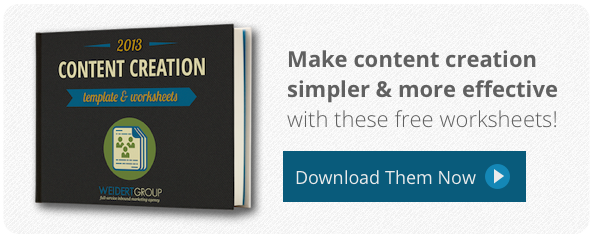
But shouldn’t they both have clear distinction from one another and only be used/referenced when appropriate, based on the specific marketing activities being utilized and what your overall goals are? Good question!
This is a topic that I’ve wanted to dive into for a while not only for myself, to help better articulate the key similarities and differences between the two, but for the countless other marketers out there searching for a clear answer on how they should reference what they’re doing with content creation as a marketing approach.
Inbound Marketing & Content Marketing Defined
Lets first look at how these two marketing disciplines are defined, according to the industry leaders for each.
Inbound Marketing (as defined by HubSpot):
“Instead of the old outbound marketing methods of buying ads, buying email lists, and praying for leads, inbound marketing focuses on creating quality content that pulls people toward your company and product, where they naturally want to be. By aligning the content you publish with your customer’s interests, you naturally attract inbound traffic that you can then convert, close, and delight over time.”
Content Marketing (as defined by Content Marketing Institute):
“Content marketing is a marketing technique of creating and distributing relevant and valuable content to attract, acquire, and engage a clearly defined and understood target audience – with the objective of driving profitable customer action.”
There’s obviously some different phrases and terminology in each definition, but also some key similarities such as the reference of “quality content” (the lifeblood for each) and “attraction”. Ok, lets dig deeper!
What Industry Experts Have to Say
I admittedly am not the first person to write on this subject. A handful of experts in the Inbound Marketing and Content Marketing field, who I follow and have the utmost respect for, have had this to say on the subject.
Joe Pulizzi (@JoePulizzi) of the Content Marketing Institute:
“Content strategy / Content marketing / Inbound marketing…let’s all get over ourselves. It’s pretty much all the same s**t.
Personally, I use content strategy when I’m talking to journalists and content strategists.
I use content marketing when I’m talking to sales and marketing professionals.
I use inbound marketing when I’m talking to small businesses.
We are indeed all media companies today and it really doesn’t matter what you call it.”
Marcus Sheridan (@TheSalesLion) of The Sales Lion
“I don’t believe our problem in the world of business and marketing is silly semantics. I also don’t believe the debate of ‘which is a subset of the other’ (inbound or content) means squat either.
The only thing I care about is that the 99% of the world who are NOT currently embracing inbound, content, social media, new age, education-based, call-it-what-you-want marketing eventually get on board with the greatest business movement that we’ve seen on this planet for decades.
Does anyone here actually think Joe Business Owner, who’s currently struggling to pay his employees and keep the lights on cares about semantic subsets and frivolous definitions of a couple of terms that are already very, very foreign??”
Michael Lieberman (@Mike2Marketing) of Square 2 Marketing
“Content marketing is a broad topic and includes a lot of different types of marketing tools. Video, webinars, emails, eBooks, whitepapers, presentations, infographics, podcasts and other content vehicles all fall into the content marketing bucket. The trick (often overlooked by the experts) is deciding what to create when and how to use it in both your new customer acquisition process and current customer communication process.
Inbound marketing provides a context for making those content decisions. Best practices include mapping both processes by target market and then applying the right type of content in the right format across the process. This ensures that content is delivered in context for each prospect at the perfect stage in their purchasing process. This isn’t easy to do but it’s the right way to do it.”
How Each Supports The Other
Joe and Marcus very clearly state that Inbound and Content Marketing are pretty much one in the same, and they’re really only separated by different titles based on when and how they’re being referred to.
I do appreciate Michael’s explanation too though, which basically says each one relies on the other. Without Inbound, your Content Marketing efforts may be lacking context at different stages in the sales funnel since often (not always) a robust Inbound Marketing software system will queue specific content depending on the lead’s interactions with your website and other content.
And Inbound would fail without the proper utilization of a well-diverse and appropriate mix of different content formats (formally referred to as Content Marketing). For example, blog content alone won’t cut it these days for a healthy Inbound program. Depending on your target personas, videos, webinars, whitepapers, case studies, etc. should all be utilized throughout the conversion process to shorten the sales cycle and efficiently close new customers.
However you prefer to refer to your use of strategic content creation (either to convert strangers into leads, leads into customers, or customers into passionate advocates for your business) the conclusion is the two disciplines should be considered as one collective approach.
Part of the separation between the two may also be influenced by the different tools we use to track, manage and automate certain portions of the process, depending on how those tools position themselves through their own verbiage. For example, HubSpot positions themselves as the “All-in-one Inbound Marketing Software.” So the majority of their customers would probably say they’re doing Inbound Marketing for their business. The fact is, in the end we’re all leveraging the power of unique and compelling content to attract & convert our best customers.
Have other thoughts to add to the discussion? Please share in the comments below!
